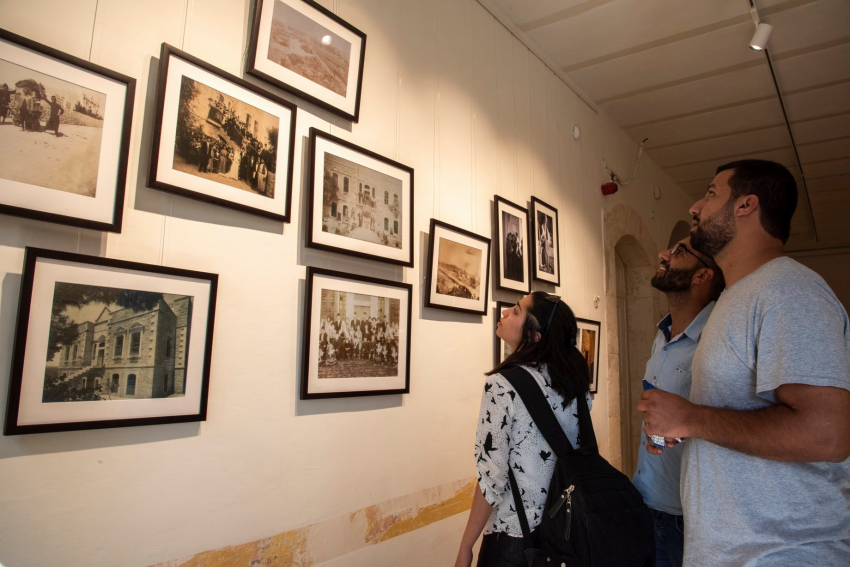

Dar Yusuf Nasri Jacir for Art and Research opened its doors to the public on Friday, 21 June in the city of Bethlehem to celebrate the inauguration of its recently renovated space and their first exhibition. The opening event attracted over 200 people, a diverse audience joining from Bethlehem, as well as Jerusalem, Hebron, Ramallah and Haifa, to support and participate in this visionary project.
Dar Jacir is an independent, artist-run initiative founded in 2014 and located in Emily and Annemarie Jacir’s family home, which was built in the late 1880s by al-Mukhtar Yusuf Jacir. The space is dedicated to educational, cultural and agricultural activities, and to hosting a series of residency programmes, seminars and workshops focusing on the visual arts and cinema.
“It was incredible to see the community come out to Dar Jacir for this event from all walks of life, and especially the trans-generational attendance of participants, from children to the elderly” says Emily Jacir, Curator and Founding Director. “One thing that really came to the fore in the works of all the artists who took part in our residency program was their deep engagement with Bethlehem and the land – the works are very local.”
For the inaugural exhibition, Emily Jacir presented the research and works of eight Palestinian and international artists who have participated in the residency programme over the past year (2018–2019). The exhibition included projects by Palestinian artists and practitioners – including Jumana Manna, who presented a series of photographs on foraging practices in Palestine and the war being waged on indigenous plants; and Ayed Arafah, from Bethlehem, who explored the limits and constraints of the Al-Ghorbal (Sieve) through different materials.
International guest artists produced site-specific works that engaged with the space and neighbourhood as part of their residency research and stay. Duncan Campbell renovated a 1987 Peugeot car as a collaborative project with the gardener Samer al Barbari and the local community; Tai Pomara gifted Dar Jacir with the signpost plaque at the entrance gates; and Sam Durant produced a large lightbox on the rooftop with an old, well-known saying handwritten by Emily Jacir, ‘يهووو الفتيت في دار جاسر ', which sparked many conversations amongst the community. One of the Landscape Residency artists, Mohammed Saleh, collaborated with children from Al Rowwad Art and Cultural Society in Aida Camp to present an Urban Farm – the first of its kind in Palestine. Vivien Sansour presented her Dar Jacir residency terrace, an ongoing research into heirloom seeds, and she also served food from her Travelling Kitchen.In addition, Emily Jacir selected a group of photographs from Dar Jacir's archives to exhibit to the public for the first time. The photographs, from both the Ottoman and the Mandate period, date back to the early 1900s and show life in and around Dar Jacir and the surrounding streets, as well as family photographs, weddings, marching troops and landscapes.
The opening event also announced the start of a sound residency programme initiated and supported by Nicolàs Jaar, who recently transformed the old Dar Jacir storage structure, which dates back over 130 years, into a sound studio, donating equipment for workshops and programmes as well as funding a sound residency programme for the upcoming year.
The first year's activities and programmes were launched in Spring 2018. Dar Yusuf Nasri Jacir for Art and Research is supported by the A.M. Qattan Foundation through the 'Visual Arts: A Flourishing Field' project, the Arab Fund for Arts and Culture (AFAC), and with the generous contributions of private donors.
The exhibition will run until 21 July 2019. Guests interested in viewing the exhibition and space can contact the office at info@darjacir.com to schedule a visit.
Cover photo by Rula Halawani
Photo in the Text by Awad Hamad
